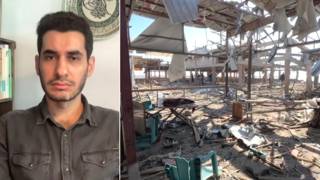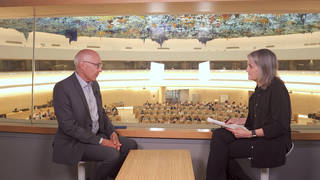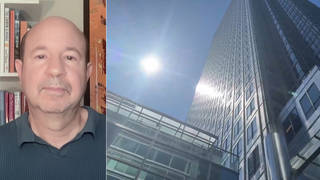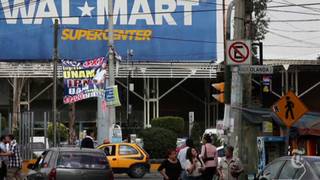
We continue our look at the massive bribery scandal behind Wal-Mart’s expansion into Mexico, with David Barstow, the Pulitzer Prize-winning New York Times reporter who broke the story. He describes how the corporate giant’s use of “outside fixers” — lawyers, lobbyists and third parties — made it difficult for the Justice Dept. to prosecute it under the Foreign Corrupt Practices Act, which makes it illegal for a U.S. company to bribe foreign officials in order to get business. “We found amazing instances of Wal-Mart building in places where, at least based on environmental rules or zoning rules or construction rules, they absolutely shouldn’t have been allowed to build. And yet, they pulled this off,” Barstow says.
Click here to see Part 1 of this interview.
AMY GOODMAN: This is Democracy Now!, democracynow.org, The War and Peace Report. I’m Amy Goodman, with Juan González.
JUAN GONZÁLEZ: We turn now to part two of our discussion of the New York Times exposé on the massive bribery scandal behind Wal-Mart’s expansion into Mexico, where the corporate giant now operates one of five of its stores worldwide. The New York Times report comes after Wal-Mart executives in the United States failed to fully investigate the corruption after it was brought to their attention. Now the U.S. Justice Department is considering whether Wal-Mart violated the Foreign Corrupt Practices Act, which makes it a crime for American corporations to bribe foreign officials.
AMY GOODMAN: For more, we’re joined once again by the Pulitzer Prize-winning New York Times reporter who broke the story. David Barstow first detailed it in April, how Wal-Mart hushed up a vast Mexican bribery case. His latest piece picks up where Wal-Mart’s limited investigation dropped off. The Times visited dozens of Mexican towns and cities to document the payoffs the company used to get its way.
David Barstow, welcome back to Democracy Now! Explain what the Foreign Corrupt Practices Act is and then how Wal-Mart responded to learning about what was happening in Mexico.
DAVID BARSTOW: The Foreign Corrupt Practices Act has kind of emerged as a very important tool in the Justice Department’s arsenal to go after corporate corruption. It’s been around for a number of decades. It was kind of a sleepy backwater for a long time, but then, in the last decade or so, the Justice Department has brought a number of very high-profile cases against some large corporations. And it has used it as a way of—and then there are a number of other countries that are also embracing the same notion of “How do we stamp out corruption, endemic corruption, by companies that are operating on a kind of a multinational scale?” And what it does, quite simply, is it says it’s illegal for a U.S. company or one of its foreign subsidiaries to pay bribes to foreign officials in order to get business.
There has been, as you might expect, an awful lot of controversy about the Foreign Corrupt Practices Act. There’s been a lot of talk in recent years, led primarily by business interests and the Chamber of Commerce, to talk about reforming the Foreign Corrupt Practices Act and perhaps limiting its reach, and perhaps bolstering the defenses that companies can use against charges that come from the Foreign Corrupt Practices Act.
JUAN GONZÁLEZ: But the interesting thing is, in your story, is that you show how difficult it is to prove or show that these kinds of bribes are taking place, because as you—as your story reports, Wal-Mart didn’t pay these bribes directly. They paid—they gave money to lawyers, who were supposed to negotiate the deals, and then the lawyers themselves apparently made the payments to particular officials to get the zoning or the construction permits that Wal-Mart wanted.
DAVID BARSTOW: This happens an awful lot, where companies will hire lawyers, lobbyists, basically third parties, to represent them in front of government agencies or government officials. And it is a complication for prosecutors who are trying to make these cases. Another complication is, the Justice Department doesn’t have jurisdiction in Mexico. They can’t send, you know, FBI agents to Mexico to go do the kinds of interviews that we did in Mexico. And so, typically what happens in these cases is they rely very heavily on the companies’ own internal investigation to help shape their own thinking about whether or not to bring charges, and if so, in what form or fashion.
AMY GOODMAN: And interestingly, Wal-Mart hired former FBI agents to do a very good investigation, actually.
DAVID BARSTOW: Yeah. And in their—and in response to the work that we’ve been doing, they’ve now hired hundreds, literally hundreds, of lawyers, forensic accountants, investigators. They’ve spent over $100 million just this year alone on their own internal investigation. It features a number of former U.S. attorneys, including David Kelley, who’s the former U.S. attorney for the Southern District here in New York, who is the main lawyer representing Wal-Mart’s audit committee at this point in time.
AMY GOODMAN: Explain how it worked in Mexico. When you talk about the lawyers and the payoffs, how did it work? How extensive was the bribery scandal?
DAVID BARSTOW: So, what we see is we see evidence of—from Wal-Mart’s own internal documentation, we see evidence of hundreds of payments to these outside lawyers. We see a policy that was approved by the top officials in Wal-Mart de México that authorized payments to these outside lawyers of up to $280,000 to expedite a single permit. What we found when we traced payments to these outside fixers and we compared them against the stores where they were targeting and the permits that they were targeting, it was kind of uncanny the way you would see a payment to a fixer, and then, lo and behold, within a week or two, whatever that critical permit was that they were, you know, trying to get, suddenly, voilà, there it is. We found amazing instances of Wal-Mart building in places where, at least based on environmental rules or zoning rules or construction rules, they absolutely shouldn’t have been allowed to build. And yet, they pulled this off. These were large amounts of money, tens of thousands of dollars, in many cases, that were paid. These were not—you know, it wasn’t—
AMY GOODMAN: To low-level people.
DAVID BARSTOW: Right. And this wasn’t—this wasn’t like slipping a clerk a hundred bucks, you know, to get a—to get, you know, a traffic permit a couple of days sooner. This was like serious amounts of money to do things that the law otherwise would have prohibited.
JUAN GONZÁLEZ: Well, we invited Wal-Mart to join us today, but they declined our request. In response to the New York Times’s articles, Wal-Mart says it began an investigation a year ago into allegations involving the permitting and licensing process for Wal-Mart de México. This is corporate communications vice president David Tovar.
DAVID TOVAR: While the investigation is ongoing, we have not waited to act. Over the past 20 months, we have made significant improvements to our compliance programs around the world and have taken a number of specific concrete actions with respect to our processes, procedures and people. Over the past several months, we have established several new compliance positions around the world, directed more than 300 third-party legal and accounting experts who have dedicated in excess of 79,000 hours to this effort, conducted more than 85 in-country visits and more than 1,000 interviews of market personnel, spent more than $35 million on new processes and procedures, and conducted training sessions attended by more than 19,000 associates.
JUAN GONZÁLEZ: That was Wal-Mart spokesman David Tovar on a statement that was posted on their website. Your response to his statement? And also, we’re talking about the largest corporation in America, one of the largest in the world, and we’re talking about a company which, if it happened in Mexico, could very well have happened in many other countries where it’s operating.
DAVID BARSTOW: I think—I think Wal-Mart has been trying to convey two basic messages. One is that they’re taking the allegations very, very seriously. They’re working very closely with the Justice Department, the SEC. The other message they’re conveying, which you saw in that clip right there, is that they are doing everything in their power right now to communicate, especially, I think, to the federal government, their commitment as a company to, whatever their sins may have been in the past, to make sure nothing like this ever happens again and to show, through things like the training they’re doing now, anti-corruption training around the world—they’ve hired a slew of new high-level positions within their executive structure whose sole job is to try to root out corruption. They have removed some people. They have either fired or forced out or put on leave a number of senior executives in Mexico and also in India. And so they’re trying to convey, I think, this idea—and it’s an important idea, certainly, when dealing with the Justice Department—that not only are we going to move heaven and earth to get to the—you know, to the bottom of whatever happened in the past; we’re also committed right now, and you can see us doing it right now, to making sure that we put in place the set of procedures and protections that will prevent this from ever happening again. This is a company that really kind of—even maybe more so than most companies, talks about the importance of acting with integrity. I mean, that’s just something that is sort of—you know, you hear over and over and over again when you deal with senior Wal-Mart executives. And so, the things that we’ve been describing here go to the core of that—of that idea.
AMY GOODMAN: Well, what happens with someone like Eduardo Castro-Wright, who was identified by the former executive who started—who blew the whistle on the corruption in Mexico—
DAVID BARSTOW: Yeah.
AMY GOODMAN: —as the driving force behind the years of bribery and then, as you point out, was promoted to vice chair of Wal-Mart in 2008? What happens to him? I mean, we’re not just talking about whether he should be in the company; we’re talking about whether he should be in jail.
DAVID BARSTOW: Well, and as we reported in April, the decision to shut down this internal investigation, it wasn’t made by some low-level lawyer. It was made, in fact, in a meeting that was chaired by Lee Scott, who was then the chief executive officer of Wal-Mart. Wal-Mart’s current chief executive officer is a man named Mike Duke. In 2005, when these allegations first surfaced, he had just been made head of Walmart International. So, this is—
AMY GOODMAN: Which means?
DAVID BARSTOW: Which means that he had authority over all of Wal-Mart’s international operations. And, in fact, he was informed specifically—we know it from the email traffic—he was informed specifically of the allegations that were being made by this lawyer, who for years had been in charge of getting permits in Mexico.
AMY GOODMAN: Can you explain, David Barstow, how workers are paid in Mexico? Talk about the vouchers they are given.
DAVID BARSTOW: Well, that’s a complicated story, and there are a number of elements to it. I mean, it is certainly the case in Mexico that the kinds of complaints we’ve long heard in the United States about low pay, low benefits, impact on small businesses, you know, all of those—impact on suppliers and supply chains—all of those are complaints that you hear in Mexico. On the other hand, there’s no denying a simple fact, which is, it’s an incredibly popular brand in Mexico. I mean, you know, you go to Wal-Marts, and it’s just—they are—shoppers are flocking to their stores.
AMY GOODMAN: But the question, what about the workers on September 4th, 2008? Mexican Supreme Court justice ruled Wal-Mart de México must cease paying its employees in part with vouchers redeemable only at Wal-Mart stores.
DAVID BARSTOW: Yeah. I mean, that’s something that has been unique to the way Mexico has paid workers, not just at Wal-Mart, but in other places, as well. But it does come back to this question, and it’s a question that you find all the time in Mexico when you start reporting on Wal-Mart in Mexico: What is this company doing? What is this company doing in terms of its impact on Mexican culture, Mexican life, communities? It’s really remarkable what’s happened, and it’s kind of been playing out over the last 10 years, and mostly no one’s been paying much attention to it. But it’s an incredible thing to behold when you go down there and travel around Mexico.
AMY GOODMAN: Finally, Brazil, China and India, did you find corruption there in Wal-Mart stores?
DAVID BARSTOW: You will have to stay tuned.
AMY GOODMAN: Well, thank you very much. David Barstow, Pulitzer Prize-winning investigative reporter for The New York Times, has just done another piece on Wal-Mart. His piece in April, Wal-Mart hushed up a vast Mexican bribery case, and now has followed up, another piece in December, how Wal-Mart used payoffs to get its way in Mexico. This is Democracy Now!, democracynow.org, The War and Peace Report.












Media Options